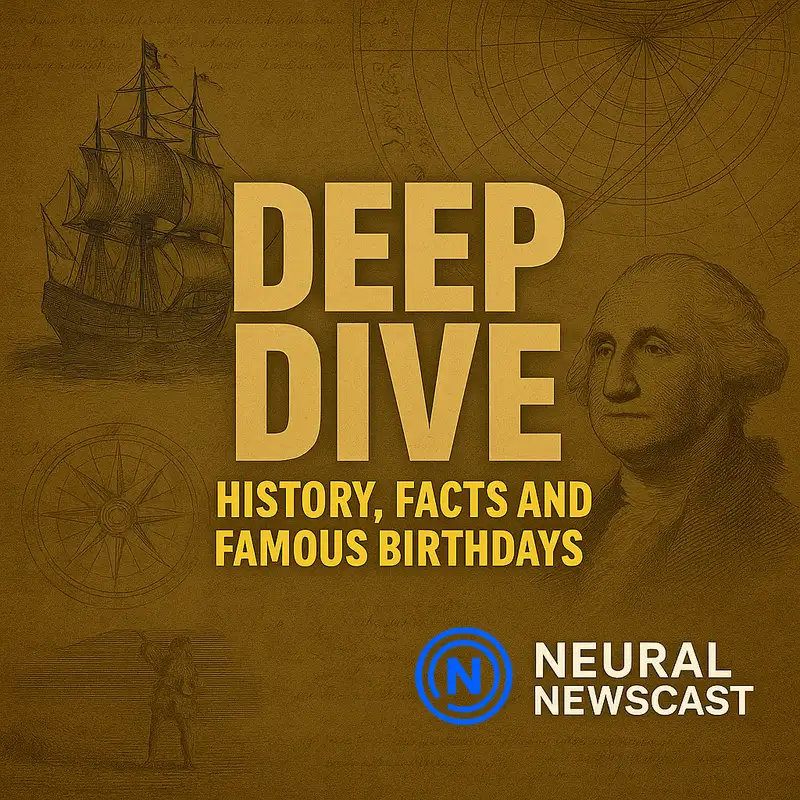Deep Dive: Tied Election Tensions, Marie Curie’s Legacy, and the Olive That Saved $40K - November 7, 2025
From Neural Newscast, this is your daily news briefing.
Get ready for a deep dive from Neural Newscast.
I'm Isabella, your psychology specialist.
And Elizabeth, our consumer correspondent,
is here as we dig into today's subjects.
On this day in 2000, the U.S. presidential race effectively deadlocked,
prompting an unprecedented nationwide focus on recounts and legal challenges
that would ultimately decide the presidency.
That single line triggers so many ripples.
National attention, the anxiety of not knowing,
and the way updates about recounts and legal procedure
became something people consumed like a product.
Exactly. Psychologically, prolonged uncertainty
heightens stress and polarization.
We latch on to narratives that reduce ambiguity, which is why every recount update felt so emotionally charged.
On the consumer side, that focus reshapes behavior.
Media consumption spikes.
Demand for expert analysis surges and people shop for trusted sources like brands.
Clarity becomes its own commodity.
There's also a social ripple.
When outcomes hinge on legal channels rather than quick vote totals,
some lose confidence while others feel reassured by procedural safeguards,
often tracking prior beliefs.
And that split has market effects, advertisers, subscription services,
and news platforms jockey for attention
while consumers decide who earns their trust for fast, accurate updates.
The courtroom focus amplified confirmation bias.
People sought interpretations that matched their hopes or fears,
feeding collective tension as the legal process unfolded.
That loop spilled into daily life.
How many outlets to check, how to talk with friends and family,
even how people behaved in stores or online while waiting for a final call.
Coping-wise, framing the moment as a test of fairness and legality can calm some
institutions, not chaos,
While for others, the drawn-out process heightens helplessness.
Meanwhile, businesses had to adapt in real time,
reallocating resources to cover the news cycle,
tweaking messaging, even pausing campaigns until clarity returned.
It's a reminder that a single political standoff
can cascade through psychology and everyday markets.
reshaping trust and decision-making long after the result is certified.
Exactly. It wasn't just ballots in courts.
It became a collective attention event that influenced what people believed,
what they bought into, and how they navigated uncertainty.
Stay with us.
More deep dive exploring coming up.
Shifting from institutions and trust to the people who shape them,
today we celebrate the birthdays of Marie Curie, 1867,
Albert Camus, 1913, and Leon Trotsky, 1879.
Marie Curie jumps out.
Physicist and chemist, first woman to win a Nobel,
and the only person with nobels in two scientific fields.
Her story practically begs for the everyday angle, how her work touches daily life.
Absolutely.
Psychologically, Curie's resilience is striking.
She persisted through systemic barriers and personal loss,
yet produced research that transformed science and clinical practice.
Her work on radioactivity directly seeded treatments we still rely on.
Practically, that means radiation-based diagnostics and therapies,
X-rays and later radiotherapy trace back to her discoveries.
Consumers benefit every day from safer, more effective care because of that foundation.
There's a human side we overlook.
She balanced deep lab work with pioneering methods under tight resources, showing how creativity and rigorous design can coexist under stress, useful lessons for anyone running complex projects or research teams.
I love that.
Plus, she's an icon of breaking gender barriers in science.
That reshapes institutions, scholarships, and hiring cultures, expanding who participates
in STEM and diversifying the innovation pipeline.
A lesser discussed psychological angle.
As both scientist and public figure, she navigated scrutiny while maintaining integrity.
that tension between persona and research focus still challenges high-profile scientists today.
Right, and the fact that she's the only person with no bells in two scientific fields underscores
the value of interdisciplinarity, which consumer sectors echo by blending tech, biology,
and design to solve problems holistically.
Her legacy also reminds us that scientific knowledge carries moral responsibility.
The same discoveries enabling treatments also raise questions of safety and ethics,
shaping how societies regulate and integrate new technologies.
And markets responded, funding priorities, safety standards, and medical protocols evolved around those findings.
Those downstream effects shape which products and services reach consumers and how safe they are.
Thinking about lasting relevance, Curie's blend of rigorous method, ethical gravity, and perseverance
offers a model for scientists and the public alike.
It's a reminder that discoveries are embedded in human stories.
Exactly. Her impact is institutional and everyday.
From hospital wards to science policy, you can trace lines back to her work.
Marking her birthday is a chance to see how one person's research can change entire systems.
Which brings us back to why her life matters psychologically.
Her example helps us reframe challenges as solvable through disciplined curiosity.
That's an enduring legacy.
Time for a quick pause.
when we return a tiny tweak with a big impact this is chad thompson i created neural newscast
to make it easier to keep up with the world without the noise if you're finding it helpful
Head to neuralnewscast.com to explore all our shows, recaps, and reports.
Thanks for staying with us on Neural Newscast Deep Dive.
Let's jump into our Fact of the Day.
In 1987, American Airlines saved $40,000 by removing a single olive from each first-class salad.
Striking. Tiny per unit tweaks scale across an airline operation
Psychologically, passengers likely didn't notice, yet the airline captured real savings.
An example of marginal changes with minimal perceived loss.
From a consumer angle, it shows how companies hunt for efficiencies in ordinary items.
Garnishes become levers for cost control without altering the core service.
It speaks to service design.
Trim elements with low customer visibility but high cumulative cost,
and you can cut expenses without provoking backlash.
And that $40,000 makes the trade-off tangible, not theoretical,
but a concrete payoff from a simple operational tweak.
It also spotlights how organizations balance perceived value versus actual cost.
An olive has symbolic value, but not enough to outweigh the savings.
For consumers, it's a reminder that seemingly minor parts of a product or service are prime targets for efficiency.
Companies constantly optimize those small details.
Exactly. Multiply it across an operation, small changes at the edge of perception can produce surprisingly large effects.
It neatly sums up operational thinking and how invisible changes can fly under the radar.
Memorable and very instructive.
That's all for this Neural Newscast deep dive.
On behalf of Isabella and me, thanks for listening.
That wraps up today's Journey Through Time on NNC, Neural Newscast.
Discover more stories and daily news episodes at our website, nnewscast.com.
Neural Newscast integrates real and AI-generated voices to facilitate efficient, high-quality news production.
Developed by human experts, our AI-generated content undergoes rigorous fact-checking and human review before publication.
While we strive for accuracy and neutrality, AI-generated content may occasionally contain errors.
We encourage listeners to verify crucial details from reliable sources.
For more on our AI transparency practices, visit newscast.com.
Creators and Guests


